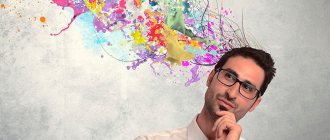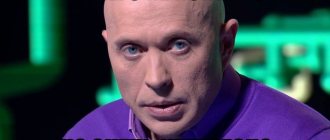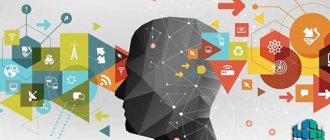Every day we are faced with many tasks, the solution of which requires our ability to think logically. Logic as the ability to think and reason consistently and consistently is required in many life situations, from solving complex technical and business problems to persuading interlocutors and making purchases in a store.
But despite the high need for this skill, we often make logical mistakes without knowing it. Indeed, among many people there is an opinion that it is possible to think correctly on the basis of life experience and so-called common sense, without using the laws and special techniques of “formal logic”. To perform simple logical operations, express elementary judgments and simple conclusions, common sense can also be suitable, but if we need to understand or explain something more complex, then common sense often leads us to errors.
The reasons for these misconceptions lie in the principles of development and formation of the foundations of logical thinking in people, which are laid in childhood. Teaching logical thinking is not carried out purposefully, but is identified with mathematics lessons (for children at school or for students at the university), as well as with solving and passing a variety of games, tests, tasks and puzzles. But such actions contribute to the development of only a small proportion of logical thinking processes. In addition, they explain to us the principles of finding solutions to tasks in a rather primitive manner. As for the development of verbal-logical thinking (or verbal-logical), the ability to correctly perform mental operations, consistently come to conclusions, for some reason we are not taught this. That is why the level of development of people's logical thinking is not high enough.
We believe that a person’s logical thinking and his ability to cognition should develop systematically and on the basis of a special terminological apparatus and logical tools. During the classes of this online training, you will learn about self-education methods for the development of logical thinking, get acquainted with the main categories, principles, features and laws of logic, and also find examples and exercises for applying the acquired knowledge and skills.
What is logical thinking?
To explain what “logical thinking” is, let’s divide this concept into two parts: thinking and logic. Now let's define each of these components.
Human thinking is a mental process of processing information and establishing connections between objects, their properties or phenomena of the surrounding world. Thinking allows a person to find connections between the phenomena of reality, but in order for the connections found to truly reflect the true state of affairs, thinking must be objective, correct or, in other words, logical, that is, subject to the laws of logic.
Logic translated from Greek has several meanings: “the science of correct thinking”, “the art of reasoning”, “speech”, “reasoning” and even “thought”. In our case, we will proceed from the most popular definition of logic as a normative science about the forms, methods and laws of human intellectual mental activity. Logic studies ways to achieve truth in the process of cognition in an indirect way, not from sensory experience, but from knowledge acquired earlier, therefore it can also be defined as the science of ways to obtain inferential knowledge. One of the main tasks of logic is to determine how to come to a conclusion from existing premises and gain true knowledge about the subject of thought in order to gain a deeper understanding of the nuances of the subject of thought being studied and its relationships with other aspects of the phenomenon under consideration.
Now we can define logical thinking itself.
Logical thinking is a thought process in which a person uses logical concepts and constructions, which is characterized by evidence, prudence, and the goal of which is to obtain a reasonable conclusion from existing premises.
There are also several types of logical thinking; we list them, starting with the simplest:
1
Figurative-logical thinking
Figurative-logical thinking (visual-figurative thinking) - various thought processes of the so-called “figurative” problem solving, which involves a visual representation of the situation and operating with images of its constituent objects. Visual-figurative thinking, in fact, is synonymous with the word “imagination”, which allows us to most vividly and clearly recreate the whole variety of different actual characteristics of an object or phenomenon. This type of human mental activity is formed in childhood, starting from approximately 1.5 years.
To understand how developed this type of thinking is in you, we suggest you take the IQ Test “Raven’s Progressive Matrices”
The Raven's Test is a progressive matrix scale for assessing IQ, mental ability, and logical thinking, developed in 1936 by John Raven and Roger Penrose. This test can give the most objective assessment of the IQ of the people being tested, regardless of their level of education, social class, type of activity, linguistic and cultural characteristics. That is, it can be said with a high probability that the data obtained as a result of this test from two people from different parts of the world will evaluate their IQ equally. The objectivity of the assessment is ensured by the fact that this test is based solely on images of figures, and since Raven's matrices are among non-verbal intelligence tests, its tasks do not contain text.
The test consists of 60 tables. You will be offered drawings with figures connected to each other by a certain relationship. One figure is missing; it is given at the bottom of the picture among 6-8 other figures. Your task is to establish a pattern that connects the figures in the picture and indicate the number of the correct figure by choosing from the proposed options. Each series of tables contains tasks of increasing difficulty, at the same time, the complication of the type of tasks is observed from series to series.
Statistics Full screen
2
Abstract logical thinking
Abstract-logical thinking is the performance of a thought process using categories that do not exist in nature (abstractions). Abstract thinking helps a person model relationships not only between real objects, but also between abstract and figurative ideas that thinking itself has created. Abstract logical thinking has several forms: concept, judgment and inference, which you can learn more about in the lessons of our training.
3
Verbal and logical thinking
Verbal-logical thinking (verbal-logical thinking) is one of the types of logical thinking, characterized by the use of linguistic means and speech structures. This type of thinking requires not only the skillful use of thought processes, but also competent command of one’s speech. We need verbal-logical thinking for public speaking, writing texts, arguing, and in other situations where we have to express our thoughts using language.
Measure the immeasurable - solve Fermi problems
The great mathematician Enrico Fermi (the same one who is famous for the paradox) believed that in 60 seconds you can evaluate absolutely everything. You only need to know a few facts to roughly calculate how many selfies are taken per day on Earth, how many times on average people use obscene language, or answer another similar question.
I'll explain with an example. Let’s say you were asked: “How many women earn extra money doing manicures in St. Petersburg?” To give an approximate answer, you can use the following logic:
- I remember that Moscow has a population of about 12 million. St. Petersburg is about 2 times smaller - let it be 6 million;
- Half of the girls I know get their nails done by a specialist; about 50% of the population are women. This means that in St. Petersburg there are potentially 1.5 million women “getting their nails done” at a salon;
- People go for a manicure about once every 2 weeks - about 26 times a year. This means that in a year in St. Petersburg it will be 1.5 million * 26 times = 39 million times;
- A manicure takes about an hour, which means one master can serve 8 clients per day;
- Now we need to find out how many masters are required to have time to do manicures 39 million times a year, with a “productivity” of 8 clients per day per specialist. 39 million / 365 days / 8 times a day = 13,356 manicurists in St. Petersburg.
Of course, this is an approximate figure. After all, masters do not work every day, and the calculation does not take into account men who do manicures, children, as well as male masters. Surely something else is missing or mixed up. But in solving such problems, the approach itself is important. By the way, large companies like to ask such questions during interviews in order to see how a person thinks, whether he thinks at all or immediately gives up and says that it is impossible to solve the problem.
Therefore, I suggest you start training. Let's think logically, how many people have given up their dreams in favor of laziness?
Applying logic
Thinking using the tools of logic is necessary in almost any area of human activity, including the exact sciences and humanities, economics and business, rhetoric and public speaking, the creative process and invention. In some cases, strict and formalized logic is used, for example, in mathematics, philosophy, and technology. In other cases, logic only provides a person with useful techniques for obtaining a reasonable conclusion, for example, in economics, history, or simply in ordinary “life” situations.
As already mentioned, we often try to think logically on an intuitive level. Some people do it well, some do it worse. But when connecting the logical apparatus, it is better to know exactly what mental techniques we use, since in this case we can:
- It’s more precise to choose the right method that will allow you to come to the right conclusion.
- Think faster and better - as a consequence of the previous point.
- It's better to express your thoughts.
- Avoid self-deception and logical fallacies.
- Identify and eliminate errors in other people’s conclusions, cope with sophistry and demagoguery.
- Use the necessary argumentation to convince your interlocutors.
Exercises for developing abstract thinking
Think about what figures can be made from these details.
The development of this type of thinking is closely related to speech activity, including the richness of vocabulary, the correct construction of sentences and the ability to analyze information.
Exercise “Prove the opposite”
This exercise is best done in writing.
In addition to convenience, written speech has another important advantage over oral speech - it is more strictly organized, streamlined and linear in nature. Here's the task itself
Choose one of the relatively simple, and most importantly, consistent statements. For example: “Sea holidays are very attractive.”
Now find arguments that prove the opposite - the more refutations, the better. Write them down in a column, admire them, and find a refutation for each of these arguments. That is, again prove the truth of the first proposition.
Exercise "Abbreviations"
This exercise is good to do in company; it is not only useful for thinking, but can also entertain you, for example, during a long journey, or brighten up the wait.
You need to take several random combinations of 3-4 letters. For example: SKP, UOSK, NALI, etc.
Next, imagine that these are not just combinations of letters, but abbreviations, and try to decipher them. Perhaps something humorous will turn out - that’s no worse. Humor promotes the development of thinking. I can suggest the following options: SKP - “Council of Creative Writers” or “Union of Crooked Hands, etc.
If you are completing a task in a team, compete to see who has the most original name and what such an organization can do.
Exercise “Working with Concepts”
Exercises with concepts, or more precisely with abstract categories, which have no analogues in the material world, well develop abstract thinking and establish a connection between thought processes at different levels. As a rule, such categories reflect the qualities, properties of objects, their interdependence or contradictions. There are many such categories, but for the exercise you can take even the simplest ones, such as “beauty”, “glory”, “hate”.
- Having chosen one of the concepts, try to explain as simply as possible (in your own words) what it is. Just avoid explanations through examples (“this, when...), they even scold you for this at school.
- Select synonyms for this concept and try to determine whether there are any differences or nuances between the main word and the synonym.
- Come up with a symbol for this concept; it can be either abstract or concrete, expressed in words or in a graphic image.
After working with simple concepts, you can move on to complex ones. For example, such as: “congruence”, “victimization”, “resistance”, etc. If you do not know what this is, then it is permissible to look at the definitions of these words, but you will still explain them in your own words.
The benefit of developing abstract thinking is not only in learning to solve logical problems. Without it, success in the exact sciences is impossible; it is difficult to understand many economic and social laws
In addition, what is important, this thinking will make speech more correct and clear, will teach you to prove your point of view based on the strict laws of logic, and not because “it seems so to me”
https://youtube.com/watch?v=C3RC5D-pn4c
Components of logical thinking
The use of logical thinking is often associated with quickly solving logic tasks and passing tests to determine the level of intellectual development (IQ). But this direction is associated to a greater extent with bringing mental operations to automatism, which is a very insignificant part of how logic can be useful to a person.
The ability to think logically combines many skills in the use of various mental actions and includes:
- Knowledge of the theoretical foundations of logic.
- The ability to correctly perform such mental operations as: classification, specification, generalization, comparison, analogy and others.
- Confident use of key forms of thinking: concept, judgment, inference.
- The ability to argue your thoughts in accordance with the laws of logic.
- The ability to quickly and effectively solve complex logical problems (both educational and applied).
Of course, such operations of thinking using logic as definition, classification and categorization, proof, refutation, inference, conclusion and many others are used by every person in his mental activity. But we use them unconsciously and often with errors, without a clear idea of the depth and complexity of those mental actions that make up even the most elementary act of thinking. And if you want your logical thinking to be truly correct and rigorous, you need to learn this specifically and purposefully.
Why you need to develop and use it in life
It is generally difficult for an adult without logic to live in this world. If this structure of thinking sags in a preschooler or schoolchild, everything is clear: “Children...” - you will say and sigh heavily. Whereas the requirements for adults are different. And if to the question “What did you do?”, you answer “On Tuesday,” then there is clearly an inconsistency here.
We have already examined the components of logical thinking, and it is difficult to live without them in life. We will not be able to combine concepts, classify them and draw conclusions from the behavior of people or situations, and we will step on the same rake.
I remember when we took the test in the subject “Logic”, some of my classmates took it 5 times and couldn’t pass. And in their lives they could see this “stepping on the rake” - the guy humiliated him several times, the other would have left the first time, but these are patient, they didn’t prepare for the session in time, others have already passed a long time ago and are resting, and these are puffing. What is the problem? The fact is that no conclusions were drawn or analyzed. So much for problems with logic!
Another example: let's turn to our forefathers. Logic allowed people to avoid not just problems, but even save their lives. Watching how lightning strikes a tree during a thunderstorm and a fire develops, they concluded that danger awaited them. This is where the habit of hiding during a thunderstorm came from. And it’s just inconvenient when drops fall down your collar!
We have come to the conclusion that logical thinking needs to be developed and it is advisable to do this as quickly as possible so as not to screw up your life! And you don’t even have to worry about looking for the best place to do it. I have already prepared for you a unique selection of courses on thinking development, where you will find answers to all your questions.
To master logic, you need to combine theory and practice, using exercises to bring logical components to automaticity, so that you can then easily apply them in real situations.
How to learn this?
Logical thinking is not given to us from birth, it can only be learned. There are two main aspects of teaching logic: theoretical and practical.
Theoretical logic
, which is taught at universities, introduces students to the basic categories, laws and rules of logic.
Practical training
aimed at applying the acquired knowledge in life. However, in reality, modern teaching of practical logic is usually associated with passing various tests and solving problems to test the level of intelligence development (IQ) and for some reason does not address the application of logic in real life situations.
To truly master logic, you need to combine theoretical and applied aspects. Lessons and exercises should be aimed at developing intuitive, automated logical tools and consolidating the acquired knowledge in order to apply it in real situations.
Based on this principle, the online training that you are reading now was compiled. The purpose of this course is to teach you to think logically and apply logical thinking techniques. Classes are aimed at introducing the basics of logical thinking (thesaurus, theories, methods, models), mental operations and forms of thinking, rules of argumentation and laws of logic. In addition, each lesson contains tasks and exercises to train you to use the acquired knowledge in practice.
Development methods
The development of abstract thinking is a long and labor-intensive process. But everything is not as scary as it might seem at first glance. In order to develop this type of thinking, a person only needs to devote an hour or an hour and a half two to three times a week to solving logical problems and puzzles. This is a very exciting process, and before you know it, it will become your favorite hobby! In the modern world, there are enough printed publications for the development of logic; exercises and assignments can also be found on the Internet. This means that finding such information will not be difficult. For example, there is a popular website that presents problems of varying complexity.
This type of thinking originates in the East since the times of the ancient world. It arose as a branch of logic. Logic itself is the ability to think and reason, to draw conclusions about things and their essence. Abstract thinking allows you to build theoretical schemes.
With regular exercise, the results will not take long to arrive. Within a few weeks, you will notice that it has become easier to think, make long-term plans, and solve issues that previously caused difficulty.
Children
The little man is an open book in which you can write anything! Children are more receptive to learning and developing any abilities. The baby’s abilities need to be developed through play. The modern toy industry offers a wide selection of games for early development. For example, these could be small puzzles, mosaics, or a banal pyramid. In adulthood, to teach your child to think, invite him to look at pictures in books and explain his understanding of what is happening in them.
Teaching a child to think abstractly is very important. Abstract thinking is not only the key to his creative development, but it is also the ability to question everything and achieve everything through experience.
Developed thinking helps to collect, analyze information and draw independent conclusions, and then support them with proven facts.
Logic lessons
Having collected a wide range of theoretical materials, as well as having studied and adapted the experience of teaching applied forms of logical thinking, we have prepared a series of lessons for the full mastery of this skill.
Lesson 1. Logical analysis of language
We will devote the first lesson of our course to a complex but very important topic - the logical analysis of language. It’s worth mentioning right away that this topic may seem abstract to many, loaded with terminology, and inapplicable in practice. Don't be scared! Logical analysis of language is the basis of any logical system and correct reasoning. The terms that we learn here will become our logical alphabet, without knowledge of which we simply cannot go further, but gradually we will learn to use it with ease.
Lesson 2. Concept in logic
A logical concept is a form of thinking that reflects objects and phenomena in their essential features. Concepts come in different types: concrete and abstract, individual and general, collective and non-collective, irrespective and correlative, positive and negative, and others. Within the framework of logical thinking, it is important to be able to distinguish these types of concepts, as well as produce new concepts and definitions, find relationships between concepts and perform special actions on them: generalization, limitation and division. You will learn all this in this lesson.
Lesson 3. Definition in logic
In the first two lessons, we talked about how the task of logic is to help us move from an intuitive use of language, accompanied by errors and disagreements, to a more orderly use of it, devoid of ambiguity. The ability to handle concepts correctly is one of the skills required for this. Another equally important skill is the ability to correctly define. In this lesson we will tell you how to learn this and how to avoid the most common mistakes.
Lesson 4. Logical reasoning
Logical judgment is a form of thinking in which something is affirmed or denied about the surrounding world, objects, phenomena, as well as relationships and connections between them. Judgments in logic consist of a subject (what the judgment is about), a predicate (what is said about the subject), a copula (what connects the subject and the predicate) and a quantifier (the scope of the subject). Judgments can be of various types: simple and complex, categorical, general, particular, individual. The forms of connectives between the subject and the predicate also differ: equivalence, intersection, subordination and compatibility. In addition, within the framework of composite (complex) judgments there can be their own connectives, which define six more types of complex judgments. The ability to think logically presupposes the ability to correctly construct various types of judgments, understand their structural elements, features, relationships between judgments, and also check whether a judgment is true or false.
Lesson 5. Laws of logic
Before moving on to the last third form of thinking (inference), it is important to understand what logical laws exist, or, in other words, objectively existing rules for constructing logical thinking. Their purpose, on the one hand, is to help build inferences and argumentation, and on the other hand, to prevent errors and violations of logic associated with reasoning. This lesson will examine the following laws of formal logic: the law of identity, the law of excluded middle, the law of contradiction, the law of sufficient reason, as well as De Morgan's laws, the laws of deductive inference, Clavius' law and the laws of division. By studying examples and completing special exercises, you will learn how to purposefully use each of these laws.
Lesson 6. Inference
Inference is the third form of thinking in which from one, two or more propositions, called premises, a new proposition, called a conclusion or conclusion, follows. Inferences are divided into three types: deductive, inductive and analogical inferences. In deductive inference (deduction), a conclusion is drawn from a general rule for a particular case. Induction is inference in which a general rule is derived from several particular cases. In inferences by analogy, based on the similarity of objects in some characteristics, a conclusion is drawn about their similarity in other characteristics. In this lesson you will become familiar with all types and subtypes of inferences and learn how to build various cause-and-effect relationships.
Lesson 7. Syllogisms
This lesson will focus on multi-premise inferences. Just as in the case of single-premise conclusions, all the necessary information in a hidden form will already be present in the premises. However, since there will now be many premises, the methods for extracting them become more complex, and therefore the information obtained in conclusion will not seem trivial. In addition, it should be noted that there are many different types of multi-premise inferences. We will focus only on syllogisms. They differ in that both in the premises and in the conclusion they have categorical attributive statements and, based on the presence or absence of some properties in objects, they allow one to draw a conclusion about the presence or absence of other properties in them.
Lesson 8. Types of reasoning
In previous lessons we talked about various logical operations that form an important part of any reasoning. Among them were operations on concepts, definitions, judgments and inferences. This means that at this point it should be clear what components the reasoning consists of. However, we have not yet touched upon the questions of how reasoning as a whole can be organized and what types of reasoning there are in principle. This will be the topic of the last lesson. Let's start with the fact that reasoning is divided into deductive and plausible. All types of inferences discussed in previous lessons: inferences using a logical square, appeals, syllogisms, enthymemes, sorites, are precisely deductive reasoning. Their distinctive feature is that the premises and conclusions in them are connected by a relation of strict logical consequence, while in the case of plausible reasoning there is no such connection. First, let's talk more about deductive reasoning.
Useful tips
To develop logic, it is not enough to pay attention to problems, solve puzzles, crosswords, and read specialized literature. There are some more tips:
- Left-handers should learn to write with their right hand and vice versa. This will improve the functioning of the less developed part of the brain.
- Change the type of activity from time to time. For example, do one thing for an hour or two, and then change jobs.
- Read detective stories, trying to predict what the main character and other characters will do in a given case. This process promotes the development of deduction.
- Explain your actions and actions. A thorough analysis of daily incidents makes it possible to build logical chains and draw conclusions regarding how best to proceed next time.
It is also worth being outside more often. Walking improves brain function in general.
How to take classes?
The lessons themselves with all the exercises can be completed in 1-3 weeks, having mastered the theoretical material and practiced a little. But to develop logical thinking, it is important to study systematically, read a lot and constantly train.
For maximum effect, we recommend that you first simply read all the material, spending 1-2 evenings on it. Then take 1 lesson daily, doing the necessary exercises and following the suggested recommendations. After you have mastered all the lessons, engage in effective repetition using this technique to remember the material for a long time. Next, try to apply logical thinking techniques more often in life, when writing articles, letters, when communicating, in disputes, in business, and even in your leisure time. Reinforce your knowledge by reading books and textbooks, as well as using additional material, which will be discussed below.
How to develop ingenuity and intelligence
Many factors influence intelligence and ingenuity. If you are forced to subject your body to constant stress, then it is not surprising that your reactions will leave much to be desired. During peak periods, the human body produces cortisol, which has a detrimental effect on brain cells. If you have to take on a ton of things in the morning, then you should try to slow down your usual pace of life at least a little. Start by not jumping out of bed immediately after the alarm clock rings - allow yourself some time (15-25 minutes) to lie down and think about the coming day.
Ways to improve your intelligence
Music.
Periodically take a break from the daily hustle and bustle by listening to music. By the way, scientists believe that classical works are very useful for activating the brain. For example, people who listen to Mozart from time to time are characterized by increased speed of thinking.
Don't waste energy.
Don't take on many tasks at once. To do something well, it is important to focus on it. If you have to answer a letter, talk on the phone and listen to the news at the same time, then, of course, attention will begin to dissipate among several sources of information. The result will be a decrease in concentration and even the level of intelligence.
More positive.
Do not deny yourself positive emotions - your performance directly depends on them. Visit parks more often, go to the movies, meet friends.
Development.
Regularly search the Internet for exercises to develop memory and enrich your vocabulary. It is unlikely that you will be “illuminated” by unexpected solutions if you have a poor vocabulary that is almost unable to hold anything in your head. To develop memory, learn poetry, just read books.
Books and textbooks on logic
On this page we have selected useful books and textbooks that will help you deepen your knowledge of logic and logical thinking:
- "Applied Logic".
Nikolai Nikolaevich Nepeyvoda; - "Textbook of Logic".
Georgy Ivanovich Chelpanov; - "Logic: lecture notes."
Dmitry Shadrin; - "Logics.
Training course" (educational and methodological complex). Dmitry Alekseevich Gusev; - “Logic for Lawyers” (collection of problems).
HELL. Getmanova; - "Logics.
Textbook for law schools." IN AND. Kirillov, A.A.Starchenko - "Logics.
Textbook for high school." Vinogradov S.N., Kuzmin A.F. - "Logics.
Textbook for humanities faculties." A.A.Ivin - "Logics".
Ivanov E.A. - And others.
How to develop logic and thinking in a teenager
Tasks, puzzles and charades
On the Internet you can find many puzzles that you and your teenager can try to solve. Try to look for tasks that contain the correct answer - if the goal is not achieved, you can see how it could have been achieved.
A special application with tasks for a smartphone
On Google Play you can easily find an application called “Logic, Problems, Puzzles” - it can be installed on your smartphone. The essence of the application is to develop analytical skills in adults and adolescents. There are also apps like Brain Training, Lumosity and many others.
Trainings
Training and development of logical thinking can be supplemented by the following trainings, which you can take for free on our website:
1. Memory and attention are important abilities for logical thinking, which will allow you to concentrate on a large number of mental objects on which logical operations are carried out.
2. Creative thinking together with logic will give you the opportunity not only to draw correct conclusions, but to look for non-standard solutions where logic has reached a dead end.
3. Oratory and writing skills form verbal and logical thinking, and also allow you to apply the acquired knowledge in practice in this course.
4. Mental arithmetic and speed reading are suitable for developing and training intellectual abilities.
5. Human psychology is useful in understanding logical thinking, because it is psychology as a science that studies mental operations, motives, and incentives of a person.
Tests
Here I have highlighted 4 tests for logical thinking that will help you see how developed it is in you.
- The Logical Reasoning Test is an online test that will determine your ability to think logically. There are 12 inferences given here and you need to choose one of the answers provided. You will see the results in a separate window.
- The method for assessing logical thinking is a test for adults that assesses your ability to make inferences, conclusions, and generalizations. You have to solve 18 tasks and check your results.
- The “Exclusion of Concepts” technique assesses the level of development of thinking, the ability to generalize, and identify certain features. You need to choose the correct answer. The test results are described in detail after passing it.
- The logical thinking test is a very informative test that shows the features of your thinking. There are 30 questions here and they are a lot of fun. You need to choose one of the presented answers that most obey the laws of logic.
Some IQ tests also tell you whether you have problems with logical thinking.
Games that help develop logic
The question: how to develop logical thinking has been exciting minds for many centuries and even millennia. Why is this happening? People have long noticed that tactics win in battle, because war is not about “who will shoot whom, but who will change his mind.” Success in business is also a kind of battle, in which the winner will again be the leader who foresaw all the risks and beat the opponent, like in a game on a chessboard.
How to develop logical thinking 6 methods
Games are simulators of life situations. After all, the future pilot is not immediately seated at the controls of the aircraft. Too risky. He trains in a flight simulator. Therefore, to easily solve life problems correctly, train your logic by playing board games. The best ones:
- Chess. The queen among logic games. Invented at least 1500 years ago. Initially, it was a mini-model of the battlefield, where the skill of fighting the enemy was honed.
- Checkers. A simpler game than chess. It can be the beginning of the development of your logical thinking. Then you can move on to chess.
- Monopoly. Here the ability to conduct a business strategy and win in competition is developed.
- Scrabble. The game resembles a crossword puzzle. Only a few people play it and have dies with letters on their hands. You need to collect words from them to beat your opponents.
- Backgammon. The game has been around for many thousands of years. The oldest set of backgammon found by archaeologists is about 3,000 years old. Backgammon develops logic and strategic thinking.
- Tag. It would seem that an elementary game is to place the tiles in the correct order from 1 to 15. But even such a simple puzzle can be the answer to the question: how to develop logic by playing games?
- Puzzles, scanwords, crosswords, sudoku. Any variety of crossword puzzles trains memory, thinking and logic.
As you can see, there are a lot of solutions on how to develop logic. Logical thinking is an important skill that you need to master in order to reason sensibly, quickly find a way out of life situations, withstand competition in business and achieve success.











